February 2022 | In this Update
Message from the Deputy Assistant Commissioner
CBP Access is an electronic newspage developed by the Office of Congressional Affairs for Members of Congress and staff. If you are interested in subscribing to the CBP Access email distribution list, please send an email to OCAInquiry@cbp.dhs.gov.
CBP may not be the first thing that comes to mind when you think about high-profile events like the Super Bowl or traditional holidays like Valentine's Day, but this past month, CBP played a central — albeit behind-the-scenes — role in both events, working hard to protect the American public and keep American industry and business thriving. Highly skilled Air and Marine Operations crews, teams of CBP officers, import specialists, and Border Patrol search, rescue, medical, and tactical units worked alongside our local and federal law enforcement partners as part of the coordinated security efforts for Super Bowl LVI. Preparation for national security events begin months in advance and involve everything from on-site security of people and products, to targeting human traffickers and seizing counterfeit merchandise. When it comes to Valentine's Day, and other holidays such as Easter and Mother's Day, CBP's agriculture specialists across the United States work tirelessly inspecting cut flower shipments. CBP agriculture specialists topped 1 billion inspected flowers for the third straight year as they made sure imported Valentine’s Day flowers were free from insects, pests and diseases that could harm the agricultural and floral industries of the United States.
— Stephanie Talton, Deputy Assistant Commissioner
CBP Provides Critical Security Support for Super Bowl LVI

SoFi Stadium
As millions of viewers tuned in to watch Super Bowl LVI on February 13, a dedicated team of highly trained personnel from the three uniformed components of CBP was on its game to make sure that the Super Bowl — one of the nation's biggest events of the year — was safe and secure for all.
Although providing a range of security measures for the Super Bowl is not new for CBP, and although CBP already has a strong presence in Southern California, every new venue means months of planning and preparation with fellow federal, state, and local law enforcement agencies.
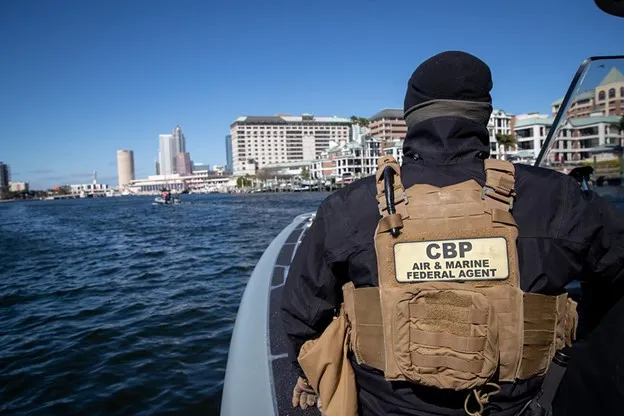
Tampa, Florida, in advance of
Super Bowl LV in 2021.
Each component of CBP — primarily Air and Marine Operations (AMO), who secure the border from the air and sea; the Office of Field Operations (OFO), who enforce a myriad of laws at international airports and ports of entry; and the U.S. Border Patrol (USBP), who work between the nation’s ports of entry — brings unique skills to the table.
Protection from the Air and Sea - AMO brought in aircrews, helicopters, and airplanes equipped with radar and cameras to help keep an eye on activities from above and maintain a “no-fly zone.” AMO boats and crews on the water also helped secure the waterways. In addition to these assets, AMO provided a secure tactical communications system that connected state, local and federal law enforcement. All information was shared with the command centers in Southern California as well as CBP headquarters back in Washington, D.C.
Ground Security - OFO checked each vehicle coming into the stadium area — everything from trucks hauling food and beverages, to the van that delivered the Super Bowl trophy just before the game. CBP officers used three large, portable X-ray trucks, known as Vehicle and Cargo Inspection Systems, to see inside and clear the vehicles for entry in just a matter of minutes or alert CBP officers to anomalies that need further scrutiny.
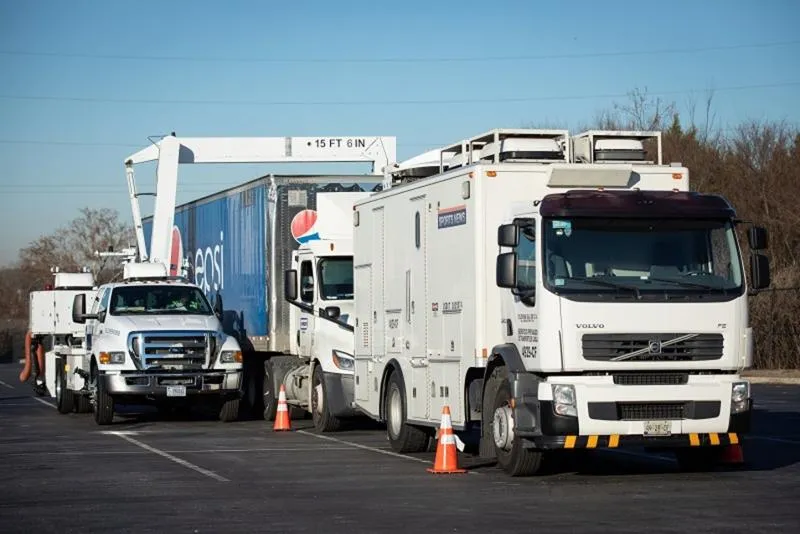
entering the stadium area in Atlanta, Georgia, in 2019
Beyond the stadium, CBP officers performed other security measures related to the Super Bowl event. CBP officers are trained to recognize suspect human trafficking — a modern form of slavery that includes everything from sweat shops to prostitution. OFO inspected travelers coming into Los Angeles by air to identify suspected individuals, handlers, and organizations trying to capitalize on that type of business in this area.
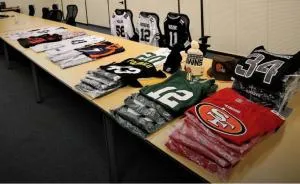
Los Angeles/Long Beach Seaport
Another important aspect of CBP’s efforts is the protection of trademarks — or intellectual property rights — to ensure Americans aren’t buying counterfeit merchandise such as fake NFL jerseys and championship rings. Trained import specialists look at the smallest details, down to the stitching on a single shirt, to determine whether it is real or fake. This important activity keeps proceeds from these sales out of the hands of criminal organizations that oftentimes use profits to fund other nefarious activities such as the illicit drug trade or terrorism. These inspections don’t just happen in the run-up to the Super Bowl; specialists inspect all sorts of items year-round and seize approximately $9 million worth of products with intellectual property rights violations every day.
Coordination and Special Teams - A central emergency operations center coordinated all the information coming in from the CBP helicopters, boat crews, community relations people, X-ray truck operators, intellectual property rights specialists, and other federal, state, and local law enforcement agents. With a venue of this size, it’s imperative to have a unified hub for gathering and distributing information and coordinating activities.

scenarios and were ready to respond at a moment’s
notice at this year’s Super Bowl.
USBP provided the special operations capabilities of a Border Patrol Tactical Unit and a Border Search, Trauma, and Rescue team. These units worked to secure the SoFi stadium campus, while standing ready to board an AMO helicopter at a moment’s notice and respond to any situation.
An especially challenging element during preparations and game day operations was the COVID-19 pandemic. The disease has sickened more than 74 million people in the United States, including infecting more than 21,600 CBP employees and killing 64. Special care was taken to protect CBP employees and the public as much as possible from the virus.
Further information on CBP's Super Bowl LVI Security Mission Overview, how CBP Intercepts Counterfeit NFL Mementos, and NFL Intellectual Property Rights, is available on CBP.gov.
CBP Works to Ensure Valentine’s Day Flowers Are Pest-Free

of roses for insects and pests.
In the weeks leading up to Valentine's Day, CBP agriculture specialists across the United States were especially busy tapping and shaking cut flower shipments. Traditionally, Valentine’s Day, Mother’s Day, and the Easter holiday weekends are the busiest times of the year for CBP agriculture specialists - the last line in the fight against the introduction of insects, pests, and agricultural diseases into the United States.
As of February 8, CBP agriculture specialists inspected more than 1.1 billion cut flowers in 482,754 shipments, intercepting 1,770 insects and pests. Of the 58 countries that import flowers to the United States, Colombia still topped the list at more than 738 million, most going to Miami International Airport. The most popular flowers remain roses, mixed bouquets, and chrysanthemums.
While it is not illegal to import flowers from other countries, certain flowers and plant materials commonly found in floral arrangements are restricted because they may carry plant pests and diseases that can cause damage to U.S. agriculture. A single pest could cause millions of dollars of damage to the nation’s crops.
CBP recommends that people who wish to import flowers, plant materials, and other agricultural items consult the CBP website or call (877) 227-5511. Travelers should also declare all items acquired abroad to CBP officers to avoid civil or criminal penalties and reduce the risk of introducing pest and disease to the United States. Additionally, CBP now offers the CBP One mobile app, which allows travelers to request a variety of CBP services, including inspection of agricultural products.

passenger's luggage
CBP Lists Top 10 Agriculture Seizures of 2021
Millions of pounds of fresh fruits, vegetables, cut flowers, herbs, and other items enter the United States via commercial shipments from other countries every year. Although these items appear to be harmless, there could be hidden threats in that baggage and in those truckloads, trainloads and containers of fresh items that could seriously threaten U.S. agriculture, our natural resources and our economy. CBP agriculture specialists and CBP officers at U.S. ports of entry and international mail facilities target, detect, intercept, and thereby prevent the entry of these potential threats before they have a chance to do any harm.
Each year, CBP agriculture specialists intercept tens of thousands of “actionable pests” – those identified through scientific risk assessment and study as being dangerous to the health and safety of U.S. agricultural resources.
In Fiscal Year 2021 alone, CBP issued 73,917 emergency action notifications for restricted and prohibited plant and animal products entering the United States, conducted 630,150 positive passenger inspections, and issued 7,190 civil penalties and/or violations to the traveling public for failing to declare prohibited agriculture items. These discoveries can range from the ordinary to the outrageous.

CBP recently published its Top 10 agricultural finds of 2021 from throughout the United States:
- In February, CBP officers at the commercial facility at the Otay Mesa Port of Entry seized more than 12,000 pounds of marijuana with a street value of $27 million found commingled within a shipment of papayas.
- In April, CBP agriculture specialists at the port of Memphis, TN inspected a shipment from China en route to New York City manifested as “The Scarf” and found that the shipment actually contained 750 unfertilized avian eggs.
- CBP agriculture specialists working at the George Bush Intercontinental Airport in Houston intercepted 15 live giant land snails from a passenger’s luggage in early July.
- In August, CBP agriculture specialists assigned to the Boston Logan International Airport encountered a 35-year-old female arriving from Santiago, Dominican Republic. During a baggage examination, 11 kilograms of pork sausages were discovered.
- CBP agriculture specialists assigned to the Paso Del Norte Border Crossing seized 320 pounds of pork bologna and 30 pounds of turkey ham in August.
- In September, a traveler arriving from Japan reluctantly declared he was in possession of Botulinum and E. coli DNA plasmids intended for research. An inspection conducted by CBP agriculture specialists revealed 27 vials of the biological material.
- Also in September, CBP agriculture specialists at the Port of Gulfport discovered a butterfly larvae pest, informally known as the Saunders 1850, while inspecting a shipment container of pineapples from Costa Rica.
- In October, CBP’s agriculture team in Minneapolis discovered six large bags containing clothing, two primate arms, dry fish, cooked snails, plant material, cow skin, bushmeat and eru plant material.
- CBP officers at the Laredo Port of Entry intercepted a large clutch of live poultry hidden throughout a vehicle back in November.
- In December, CBP agriculture specialists in Newark encountered a shipment of fresh peppers from Guatemala with a fraudulent phytosanitary certificate.
Whether it is the prevention of an introduced foreign animal disease, an invasive plant pest, or unknown biological material, CBP's agriculture specialists and our agriculture canine teams are steadfast in their determination to keep America’s agriculture and natural resources safe. Learn more about CBP's agriculture inspection and security mission on CBP.gov.
CBP Alerts the Public to Ongoing Phone Scams

CBP is alerting the public to numerous telephone scams that have been targeting residents nationwide. CBP is aware of reports of individuals receiving unsolicited calls from scammers posing as U.S. Border Patrol agents and U.S. Customs and Border Protection officers. Residents are reporting calls with a pre-recorded message stating, “a box of drugs and money being shipped has your name on it and has been intercepted.” Others are reporting calls from individuals claiming to be CBP employees and informing call recipients that there is a warrant for their arrest or requesting information in exchange for Bitcoin. In either case, the resident is instructed to provide banking information or other personal identifiable information, such as social security numbers or dates of birth.
These calls are phone scams/phishing attempts and have been circulating for the past few years. Residents are urged to not provide the caller with any information. The Department of Homeland Security and CBP do not solicit money over the phone, nor do they use Bitcoin, other digital currency, or gift cards. If such calls are received, people should make a note of the number and any other pertinent details about the call and immediately hang up, and then report the incident to a local police department and the Federal Trade Commissioner at https://reportfraud.ftc.gov/. If you would still like to talk to someone from CBP, please contact the CBP Information Center at (877) 227-5511.
Enforcement News From Across CBP
CBP Officers Seize over $18 Million in Methamphetamine
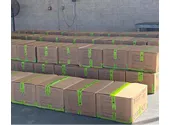
Pharr, TX — On February 15, 2022, CBP officers assigned to the Pharr International Bridge cargo facility encountered a commercial tractor trailer arriving from Mexico. A CBP officer referred the conveyance for further inspection, which included utilizing non-intrusive imaging (NII) equipment and screening by a canine team. After physically inspecting the conveyance, officers extracted 1,348.83 pounds (611.82 kg) of alleged methamphetamine concealed within the trailer. CBP OFO seized the narcotics and tractor trailer, and the case remain under investigation by agents with U.S. Immigration and Customs Enforcement’s Homeland Security Investigations (ICE-HSI).
Border Patrol Apprehends Four Mara-Salvatrucha Gang Members in the Rio Grande Valley Sector
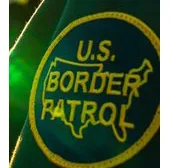
Edinburg, TX — Rio Grande Valley (RGV) Sector Border Patrol agents recently arrested four Salvadoran gang members. On February 15, McAllen Border Patrol Station agents arrested a Salvadoran national near Hidalgo, whose record checks revealed he is a Mara-Salvatrucha (MS-13) gang member. In 2020, the man was sentenced to five months incarceration and one year of supervised release in Baltimore, Maryland, for an immigration violation. He was subsequently removed from the United States. That afternoon, processing agents discovered another Salvadoran national whose record checks revealed he is an MS-13 gang member with no previous arrests in the United States. Then on February 16, processing agents encountered two Salvadoran nationals whose record checks revealed they are MS-13 gang members. The two individuals have numerous removals from the United States.
CBP Officers Seize Massive Meth and Fentanyl Load in Arizona
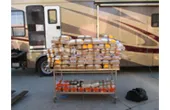
Tucson, AZ — On February 13, CBP officers at the Port of Lukeville arrested a Phoenix man and seized nearly 880 pounds of methamphetamine and more than 110 pounds of suspected fentanyl. That morning, officers referred a 47-year-old Phoenix man for additional inspection of his 2008 Roadmaster RV as he attempted to enter the United States. Following a positive alert by a CBP narcotics detection canine to a scent it is trained to detect, the search led to the discovery of 129 packages of drugs hidden within the roof mounted A/C unit. The drugs were determined to be a combination of methamphetamine and fentanyl worth nearly $4.4 million dollars. Officers seized the drugs and vehicle, while the subject was arrested and then turned over to ICE-HSI.
Office of Congressional Affairs | February 2022

